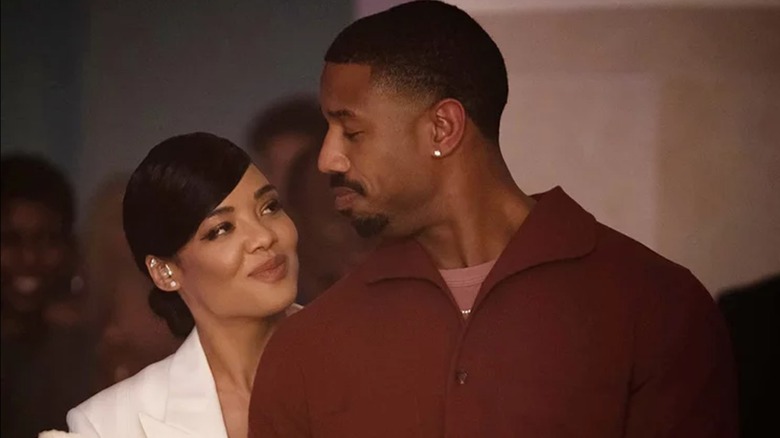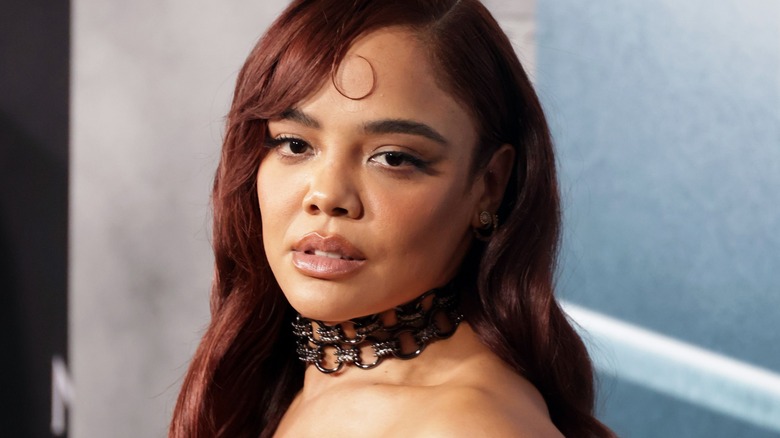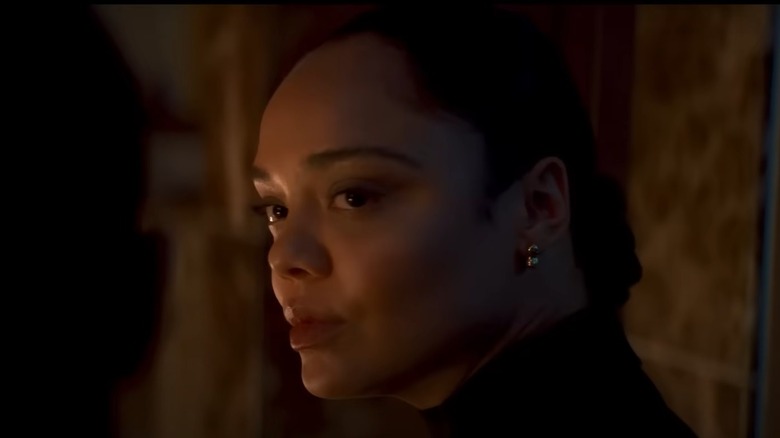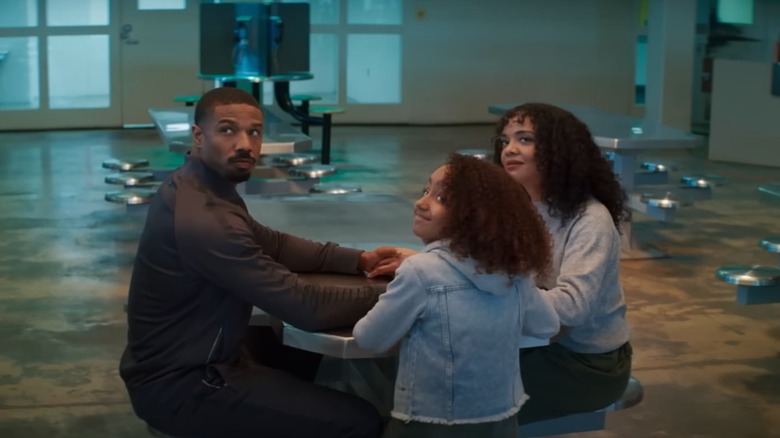Tessa Thompson On The Complexity Of Portraying Bianca's Journey In Creed III - Exclusive Interview
In the "Creed" universe, Bianca (Tessa Thompson) has gone through quite a journey, from a talented singer living next to Adonis Creed to a powerful, award-winning artist and producer (who also happens to be the mother of his daughter Amara, played by Mila Davis-Kent). Bianca is an extraordinary character, a highlight in this boxing-driven world despite never putting on gloves, and she manages all this while living with the effects of a degenerative hearing loss condition.
Tessa Thompson is no stranger to unique and complex roles, like incisive radio host Sam White in "Dear White People," Agent M in "Men in Black: International," and an actual Valkyrie in the MCU. She excels at choosing roles that are smart, incisive, and powerful, bringing them to life with a realistic vibrancy.
In an exclusive interview with Looper, Tessa Thompson discusses Bianca's journey throughout the series. She discusses the complexity of the character's evolution over three films, along with her role in shaping it with directors Ryan Coogler, Steven Caple Jr., and Michael B. Jordan. She also chats about the character's fashion and describes the "Creed III" scenes she hopes make it into the film's director's cut.
Being invited to co-author Bianca's journey
It's been wonderful to see Bianca's evolution over the several "Creed" films, and her story's been so compelling on its own, both with and separate from Adonis. What discoveries have you made playing her over the years?
That's such a good question. We're not always asked those. I [have made] a lot of discoveries. First of all, the challenge of playing Bianca is, how do you, inside of the page space that we have that we can dedicate to the character, make sure that she is her own person with a rich emotional life? Something that feels exciting is that I've always been invited to be kind of a co-author and figure that out with the collaborators, starting with Ryan Coogler, who so fiercely invited me into that process.
Something that's been interesting is thinking [how] it's such a unique challenge to play a character over this many years of your own personal life. There's always this idea [of] approaching [a] character [with] the things that you either diminish in yourself or expand. And [it's exciting to be] invited to bring the things that you might be wrestling with to the character, or have the opportunity to do the things that you cannot or will not do in your own life inside of a role. There's symmetry between us in the sense that, for example, I've begun producing in earnest, and that's really exciting for me. And it's also bittersweet to enter a new phase in your career.
When you're first beginning something, every win, you're blindly like, "wow." When you become more seasoned, things complicate in a way that's really beautiful, but there's a sense of mourning with that. I was really interested to explore that with her this time around. I'm not a mother at a time when a lot of people tell you maybe ought to be, so getting to explore what motherhood means to me inside of playing a dedicated mother, Bianca, is incredible. That's the gift of playing this part, and certainly, it's also a gift to get to support my friend as he enters this new chapter, with Michael B. Jordan behind the camera.
Learning new things about director Michael B. Jordan
What was that transition like? You two have some remarkably intimate scenes in this film that are so well played, and yet there's a different category that he has in this film in addition to the other two films. Was that a smoother transition for both of you?
Yeah, it was really smooth. It felt seamless because it has always felt like it's such a deep collaboration. Not that he's ever directed me, but it feels like we are always directing each other in these parts, because we're constantly, when we're doing the work, like, "How is that doing? What do you think?" We've always worked that way in general, so that didn't feel odd at all.
What was interesting are the kinds of things that a director has their hands in. For example, I was so surprised [by] how much he cared about clothes. I've always had so much agency with Bianca because previous directors [were] like, "I don't know, just wear whatever you think she would wear." And he was so focused on that in a way that was really fascinating.
So those things were new, but [when you're] this deep into a friendship and a collaboration, you want to break new ground and find new territory, and it's nice. You think you know someone, you have their number, and it's so nice to be surprised by someone that you love and know super well. I love seeing things be true about him that I suspected were, like that he's a really fantastic leader, and I love being surprised by the things that I didn't think that he would care so much about, [like] what shoes I wore.
It pays off because I definitely made [a] mental note watching the film the other night [of] all the clothes, every character. I was like, "That fit is so good."
Yeah, he's into a fit. I guess I shouldn't have been surprised by that because he's a fashion guy.
Dealing with Bianca's health responsibly
It's been really personally inspiring and helpful for me to see a character like Bianca over the "Creed" films dealing with health issues, disability issues, and not becoming a token character because of it. Did you have to advocate for that during this entire process, or was it already baked into the scripts?
There was some work, I think. For example, we had the idea in the first film of the love interest in a sports movie wearing a hearing aid. Not everyone was like, "That makes sense!" There were definitely moments Ryan and I were like, "This is why it makes sense!"
Also, I think [of] advocacy the other way around, which is that there is a limit to representing a community that I'm not a part of. There's a limit to what we can do inside of Bianca, because we could have gone all the way and had her hearing loss progress all the way. And certainly, that was a conversation at some point, and I was like, "That's not something that I think makes sense." If we want to tell the story, we invite someone inside of that community into it. What feels incredible is to get to do that with Mila and have that representation, which is remarkable and not for nothing. Being able to do that in this kind of movie, with this kind of audience, is really, really something.
Just by the nature of the beast, was there stuff that had to be dropped that you were really in love with?
Yeah, there was some stuff, but that's the filmmaking process. You had to kill your darlings, and it's something that I'm looking to do, especially as a producer. I've produced some things that I'm into, so I've exercised that muscle of being like, "I really love this, but it's got to go." So I was ready and prepared for that, but there were some things, particularly this idea of therapy and working through emotions and being able to cope. There was a little more real estate than we had before, with Bianca being able to talk to Mila and help her figure out how to work through some of her anger, some of her frustration.
That model of parenting is really, really special, and we had to lose some of that. But I feel like we still were able to honor the things that we talked about in development, and when I saw the film, it made sense to me. It was only [when] thinking about it after you ask[ed] the question that I'm like, "Oh, yeah, there were some things that we shot that didn't make it," but it's always that way.
Well, as a physical media guy, I hope it's on the DVD.
Right. I can't wait for the director's cut.
"Creed III" hits theaters today. This interview has been edited for clarity.



